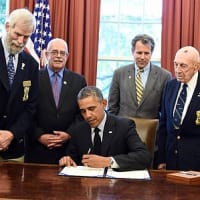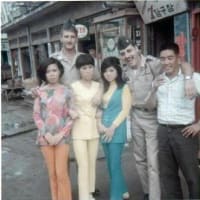【参政権】「在日の参政権獲得とともに、日本社会を内部から変化させろ」
http://news18.2ch.net/test/read.cgi/news4plus/1121431120/
【コラム】日本の外交は誰が動かしているのか。
「日本で最も政治的にパワーのある人」を捜しだすためにやってきた宇宙人があちこちを歩き回ったが、徒労に終わり、帰ってしまったというおどけ話を耳にしたことがある。日本の政治構造は、伝統的に非常に分権的だ。天皇制という制度自体が、政治的にはその実体があい昧だ。ある学者はそれを、真ん中ががらんとあいている「ドーナツ型の権力構造」だとした。政治学者・丸山真男氏が語る「無責任の体系」でもある。
日本の「右傾化」を考えるとき、こうした認識が必要なものと思われる。現在、日本の「平和憲法」体制が急速に変質する兆しを見せているのは事実だ。しかし、それが日本全体がひとかたまりになった体系的な動き、だと考えるのは「まだ」むずかしい。長期的な戦略のもと着々と進められる、統制され、計算された「野心」や「陰謀」を、客観的に確認するのも容易ではない。いま日本の問題は、一貫した戦略の「過剰」ではなく、全体的な外交戦略の「不在」にある、と判断すべきだろう。
長い間、官僚が統制してきた外交が、脱冷戦の変化について行けず、右往左往する間に、部分的に各「特殊な利益」がばっこし、外交を乱れさせている。日本国民も漠然とした不安感のなか、客観的な利害関係よりは感情的なスローガンに動員されている。これまで、日本外交の行方を決めたものは、拉致(らち)、歴史(靖国神社参拝)、そして自衛隊にまとめられる。昨年11月の「にせ遺骨」事件以降、日本政府が「拉致被害者の一部は生存している」という前提のもと「早期の帰還」を正式に求めて以来、朝・日交渉は停滞している。
日本内では経済制裁の発動を求める声が高まったが、ブッシュ米政権が「対北朝鮮交渉論」に転じる兆しを見せるにつれ、日本は悩みに陥った。北朝鮮への強硬姿勢が、北東アジア外交で日本をむしろ孤立させているからだ。靖国神社参拝と歴史教科書問題には、日本国内政治の計算、根深い保守的歴史観、日本の相対的な位相低下に対する保守右派の危機意識--など諸要素が絡まっている。歴史問題が韓国や中国との関係を悪化させていて、民主党だけでなく執権自民党内でも、靖国神社の代案に対する模索や東アジア外交の再構築をめぐる議論が具体化しつつある。
しかし、国内外的に窮地に追い込まれた小泉首相がむしろ「8月15日に靖国神社参拝」という、真向かいからの突破に踏み切る兆しさえあり、扶桑社版歴史教科書も5年前よりは採択率が大きく高まるもようだ。自衛隊も、米国の軍事戦略・北朝鮮の脅威などに支えられ、日本の軍事力行使に課された政治的かつ物理的な制約を一つずつ解消する「普通国家化」を進めてきた。しかし、これは、日米の軍事的一体化、つまり日本が軍事的に米国に統合される過程でもあり、日本としては「もろ刃の剣」のような選択だ。日本の国益に常に一致するとの保障がないという悩みが伴われる。
複雑な構造を持った日本の「右傾化」を代える方法も多様に講じられるべきだろう。第一、圧力、すなわち「外圧」は肝要だ。靖国を含め歴史問題の原則を明確にするのは、日本への問題提起のため依然として必要とされる。韓国政府の「歴史問題提起」は、これまで便宜的かつ一時的な性格が強かったのも事実だ。
第二に、「包容」の戦略も必要とされる。日本の大衆に迫る形と言語でもって批判的なメッセージを伝えること、「日本の良心勢力」だけでなく、政財界の指導層にも食い込むため努力すること、日本の将来の方向も視野に入れた「地域の安全保障協力体制」を多角的に試みること--などが、それに含まれるだろう。
第三に、在日韓国人の地方参政権獲得とともに、日本社会を内側から変化させる方法も進めなければならない。そうした点から、今回、韓国が先に、永住する外国人に地方参政権を付与する措置を取ったのは、高く評価されうる。日本が歩む道に韓国が及ぼす影響力は少なくない。
[略歴]1953年生れ。ソウル大中退。日本の国際基督教大学卒業。東大・大学院修了(法学博士)。専攻は東アジア国際政治。米プリンストン大学・客員研究員。著書に『東アジア冷戦と韓米日関係』など。
李鐘元(イ・ジョンウォン、立教大学教授、国際政治学)
中央日報 2005.07.15 18:50:32
http://japanese.joins.com/article/article.php?aid=65632&servcode=200&code=200
※この記事はしばらくして削除されたが、英語版の記事は掲載中↓
[OUTLOOK]Changing Japan from within
July 19,2005
I heard a joke that an alien who came to Earth to find the most influential politician in Japan had to go back in vain. The political structure of Japan is traditionally decentralized. The political substance of the imperial system is ambiguous. A scholar once called it a “donut-shaped power structure,” with a hollow center. It is what political scientist Masao Maruyama calls a “system of irresponsibility.”
We certainly need to consider this perspective when we look at Japan’s inclination to the right. Today, there certainly are signs that the “peace constitution” of Japan is about to change rapidly. However, we cannot yet conclude that it is a systematic move of Japan as a whole. It is not easy to objectively confirm that it is a meticulously planned conspiracy.
The current problem of Japan is not in the “surplus” of consistent strategies but in the “absence” of general diplomatic strategies. While the nation’s foreign policies, which had long been controlled by bureaucrats, wandered around failing to keep up with post-Cold War changes, special interests of some parts of the society prevailed and swayed diplomacy. With all this instability, Japanese citizens are moved by emotional slogans instead of objective interests.
What have defined the direction of Japan’s foreign policy are the North Korean abductions of Japanese citizens, its wartime history, the Yasukuni Shrine visits and the Self-Defense Forces.
After the remains that North Korea provided last November turned out not to be those of a kidnapped Japanese woman, the negotiations between Tokyo and Pyongyang have been deadlocked, and the Japanese government has officially demanded an “immediate return” of its citizens it believes might still be alive in the North.
While the Japanese public increasingly called for economic sanctions against the North, Tokyo has been in a dilemma as the Bush administration shows signs of returning to negotiations with Pyongyang. In the course of diplomacy in Northeast Asia, the hard-line policy against North Korea is isolating Japan instead.
The matters of the Yasukuni Shrine visits and the country’s right-wing history textbooks are entangled with Japan’s domestic politics, conservative historical perspectives and the conservatives’ sense of crisis that stems from Japan’s loss of status in the region.
As the historical issue aggravates Japan’s relations with Korea and China, not only the Democratic Party but also some insiders of the ruling Liberal Democratic Party are seeking an alternative to the Yasukuni Shrine visits and discussing a reorganization of East Asian foreign policy.
However, Prime Minister Junichiro Koizumi, who is in a tight spot both domestically and internationally, might make a drastic move by visiting the Yasukuni Shrine on Aug. 15, the day Japan officially surrendered to the Allied forces in 1945.
The Husosha history textbook is expected to be used more widely than five years ago, and encouraged by the military strategy of the United States and the potential threat posed by North Korea, the Self-Defense Forces have gradually removed political and physical restrictions on the exercise of Japan’s military power.
However, the process is a part of a military consolidation between Japan and the United States, that is, Japan is being integrated into the United States militarily.
To Japan, the choice is a double-edged sword. Its concern is that there is no guarantee that a military consolidation will contribute to Japan’s best interests.
We need to devise various strategies to respond to Japan’s move to the right.
First of all, we need to consider “external pressure.” We still need to clearly define a principle for historical matters, including the Yasukuni Shrine visits, in order to properly raise these issues in Japan. It is true that the Korean government’s complaints regarding the historical matters have been short-lived and inconsistent.
Second, we need an engagement strategy. We should deliver critical messages to the Japanese public in a form and words that are persuasive to them. Also, we should appeal not only to the Japanese who have consciences but also to the political and economic leaders.
These attempts should embrace the future direction of Japan as a partner that will help guarantee regional security.
Thirdly, along with obtaining suffrage for local elections for the Koreans residing in Japan, we need to seek ways to change Japanese society from within. In that sense, Korea was right to take the initiative and give voting rights to resident foreigners.
The influence Korea can exercise over Japan’s direction is considerably diverse and significant.
* The author is a professor of international relations at Rikkyo University in Japan. Translation by the JoongAng Daily staff.
by Lee Jong-won
http://koreajoongangdaily.joins.com/news/article/article.aspx?aid=2595914
http://news18.2ch.net/test/read.cgi/news4plus/1121431120/
【コラム】日本の外交は誰が動かしているのか。
「日本で最も政治的にパワーのある人」を捜しだすためにやってきた宇宙人があちこちを歩き回ったが、徒労に終わり、帰ってしまったというおどけ話を耳にしたことがある。日本の政治構造は、伝統的に非常に分権的だ。天皇制という制度自体が、政治的にはその実体があい昧だ。ある学者はそれを、真ん中ががらんとあいている「ドーナツ型の権力構造」だとした。政治学者・丸山真男氏が語る「無責任の体系」でもある。
日本の「右傾化」を考えるとき、こうした認識が必要なものと思われる。現在、日本の「平和憲法」体制が急速に変質する兆しを見せているのは事実だ。しかし、それが日本全体がひとかたまりになった体系的な動き、だと考えるのは「まだ」むずかしい。長期的な戦略のもと着々と進められる、統制され、計算された「野心」や「陰謀」を、客観的に確認するのも容易ではない。いま日本の問題は、一貫した戦略の「過剰」ではなく、全体的な外交戦略の「不在」にある、と判断すべきだろう。
長い間、官僚が統制してきた外交が、脱冷戦の変化について行けず、右往左往する間に、部分的に各「特殊な利益」がばっこし、外交を乱れさせている。日本国民も漠然とした不安感のなか、客観的な利害関係よりは感情的なスローガンに動員されている。これまで、日本外交の行方を決めたものは、拉致(らち)、歴史(靖国神社参拝)、そして自衛隊にまとめられる。昨年11月の「にせ遺骨」事件以降、日本政府が「拉致被害者の一部は生存している」という前提のもと「早期の帰還」を正式に求めて以来、朝・日交渉は停滞している。
日本内では経済制裁の発動を求める声が高まったが、ブッシュ米政権が「対北朝鮮交渉論」に転じる兆しを見せるにつれ、日本は悩みに陥った。北朝鮮への強硬姿勢が、北東アジア外交で日本をむしろ孤立させているからだ。靖国神社参拝と歴史教科書問題には、日本国内政治の計算、根深い保守的歴史観、日本の相対的な位相低下に対する保守右派の危機意識--など諸要素が絡まっている。歴史問題が韓国や中国との関係を悪化させていて、民主党だけでなく執権自民党内でも、靖国神社の代案に対する模索や東アジア外交の再構築をめぐる議論が具体化しつつある。
しかし、国内外的に窮地に追い込まれた小泉首相がむしろ「8月15日に靖国神社参拝」という、真向かいからの突破に踏み切る兆しさえあり、扶桑社版歴史教科書も5年前よりは採択率が大きく高まるもようだ。自衛隊も、米国の軍事戦略・北朝鮮の脅威などに支えられ、日本の軍事力行使に課された政治的かつ物理的な制約を一つずつ解消する「普通国家化」を進めてきた。しかし、これは、日米の軍事的一体化、つまり日本が軍事的に米国に統合される過程でもあり、日本としては「もろ刃の剣」のような選択だ。日本の国益に常に一致するとの保障がないという悩みが伴われる。
複雑な構造を持った日本の「右傾化」を代える方法も多様に講じられるべきだろう。第一、圧力、すなわち「外圧」は肝要だ。靖国を含め歴史問題の原則を明確にするのは、日本への問題提起のため依然として必要とされる。韓国政府の「歴史問題提起」は、これまで便宜的かつ一時的な性格が強かったのも事実だ。
第二に、「包容」の戦略も必要とされる。日本の大衆に迫る形と言語でもって批判的なメッセージを伝えること、「日本の良心勢力」だけでなく、政財界の指導層にも食い込むため努力すること、日本の将来の方向も視野に入れた「地域の安全保障協力体制」を多角的に試みること--などが、それに含まれるだろう。
第三に、在日韓国人の地方参政権獲得とともに、日本社会を内側から変化させる方法も進めなければならない。そうした点から、今回、韓国が先に、永住する外国人に地方参政権を付与する措置を取ったのは、高く評価されうる。日本が歩む道に韓国が及ぼす影響力は少なくない。
[略歴]1953年生れ。ソウル大中退。日本の国際基督教大学卒業。東大・大学院修了(法学博士)。専攻は東アジア国際政治。米プリンストン大学・客員研究員。著書に『東アジア冷戦と韓米日関係』など。
李鐘元(イ・ジョンウォン、立教大学教授、国際政治学)
中央日報 2005.07.15 18:50:32
http://japanese.joins.com/article/article.php?aid=65632&servcode=200&code=200
※この記事はしばらくして削除されたが、英語版の記事は掲載中↓
[OUTLOOK]Changing Japan from within
July 19,2005
I heard a joke that an alien who came to Earth to find the most influential politician in Japan had to go back in vain. The political structure of Japan is traditionally decentralized. The political substance of the imperial system is ambiguous. A scholar once called it a “donut-shaped power structure,” with a hollow center. It is what political scientist Masao Maruyama calls a “system of irresponsibility.”
We certainly need to consider this perspective when we look at Japan’s inclination to the right. Today, there certainly are signs that the “peace constitution” of Japan is about to change rapidly. However, we cannot yet conclude that it is a systematic move of Japan as a whole. It is not easy to objectively confirm that it is a meticulously planned conspiracy.
The current problem of Japan is not in the “surplus” of consistent strategies but in the “absence” of general diplomatic strategies. While the nation’s foreign policies, which had long been controlled by bureaucrats, wandered around failing to keep up with post-Cold War changes, special interests of some parts of the society prevailed and swayed diplomacy. With all this instability, Japanese citizens are moved by emotional slogans instead of objective interests.
What have defined the direction of Japan’s foreign policy are the North Korean abductions of Japanese citizens, its wartime history, the Yasukuni Shrine visits and the Self-Defense Forces.
After the remains that North Korea provided last November turned out not to be those of a kidnapped Japanese woman, the negotiations between Tokyo and Pyongyang have been deadlocked, and the Japanese government has officially demanded an “immediate return” of its citizens it believes might still be alive in the North.
While the Japanese public increasingly called for economic sanctions against the North, Tokyo has been in a dilemma as the Bush administration shows signs of returning to negotiations with Pyongyang. In the course of diplomacy in Northeast Asia, the hard-line policy against North Korea is isolating Japan instead.
The matters of the Yasukuni Shrine visits and the country’s right-wing history textbooks are entangled with Japan’s domestic politics, conservative historical perspectives and the conservatives’ sense of crisis that stems from Japan’s loss of status in the region.
As the historical issue aggravates Japan’s relations with Korea and China, not only the Democratic Party but also some insiders of the ruling Liberal Democratic Party are seeking an alternative to the Yasukuni Shrine visits and discussing a reorganization of East Asian foreign policy.
However, Prime Minister Junichiro Koizumi, who is in a tight spot both domestically and internationally, might make a drastic move by visiting the Yasukuni Shrine on Aug. 15, the day Japan officially surrendered to the Allied forces in 1945.
The Husosha history textbook is expected to be used more widely than five years ago, and encouraged by the military strategy of the United States and the potential threat posed by North Korea, the Self-Defense Forces have gradually removed political and physical restrictions on the exercise of Japan’s military power.
However, the process is a part of a military consolidation between Japan and the United States, that is, Japan is being integrated into the United States militarily.
To Japan, the choice is a double-edged sword. Its concern is that there is no guarantee that a military consolidation will contribute to Japan’s best interests.
We need to devise various strategies to respond to Japan’s move to the right.
First of all, we need to consider “external pressure.” We still need to clearly define a principle for historical matters, including the Yasukuni Shrine visits, in order to properly raise these issues in Japan. It is true that the Korean government’s complaints regarding the historical matters have been short-lived and inconsistent.
Second, we need an engagement strategy. We should deliver critical messages to the Japanese public in a form and words that are persuasive to them. Also, we should appeal not only to the Japanese who have consciences but also to the political and economic leaders.
These attempts should embrace the future direction of Japan as a partner that will help guarantee regional security.
Thirdly, along with obtaining suffrage for local elections for the Koreans residing in Japan, we need to seek ways to change Japanese society from within. In that sense, Korea was right to take the initiative and give voting rights to resident foreigners.
The influence Korea can exercise over Japan’s direction is considerably diverse and significant.
* The author is a professor of international relations at Rikkyo University in Japan. Translation by the JoongAng Daily staff.
by Lee Jong-won
http://koreajoongangdaily.joins.com/news/article/article.aspx?aid=2595914



















